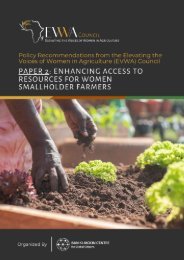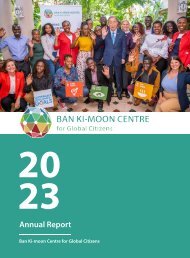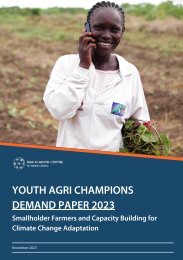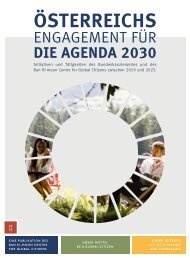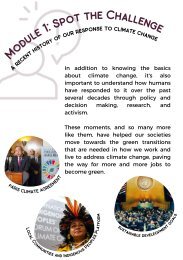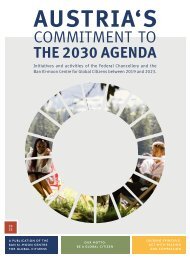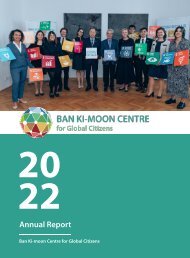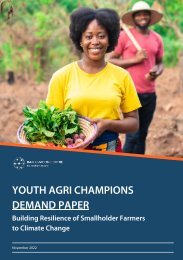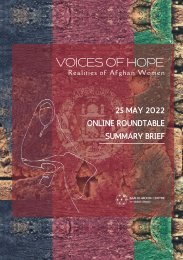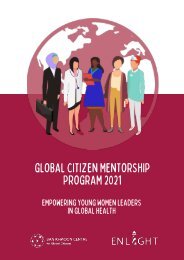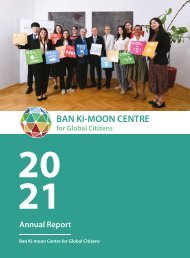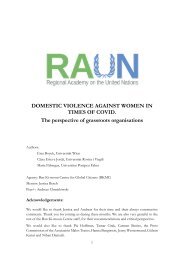EVWA Council Policy Paper 1: Enhancing Access to Land For Women Smallholder Farmers
The "EVWA Council Policy Paper 1: Enhancing Access to Land For Women Smallholder Farmers" is the first in a series of three policy papers, produced by the Ban Ki-moon Centre for Global Citizens's EVWA Council together with women smallholder farmers and young changemakers. The paper includes their perspectives in policy recommendations to tackle the main challenges women smallholder farmers face.
The "EVWA Council Policy Paper 1: Enhancing Access to Land For Women Smallholder Farmers" is the first in a series of three policy papers, produced by the Ban Ki-moon Centre for Global Citizens's EVWA Council together with women smallholder farmers and young changemakers. The paper includes their perspectives in policy recommendations to tackle the main challenges women smallholder farmers face.
Create successful ePaper yourself
Turn your PDF publications into a flip-book with our unique Google optimized e-Paper software.
<strong>Policy</strong> Recommendations from the Elevating the Voices of<br />
<strong>Women</strong> in Agriculture (<strong>EVWA</strong>) <strong>Council</strong><br />
<strong>Paper</strong> 1: <strong>Enhancing</strong> <strong>Access</strong> <strong>to</strong> <strong>Land</strong> for <strong>Women</strong><br />
<strong>Smallholder</strong> <strong>Farmers</strong><br />
<strong>Women</strong> produce approximately 70% of food in<br />
African countries, despite gender gaps in<br />
access <strong>to</strong> land, resources, and leadership that<br />
reduce their average output per hectare.<br />
<strong>Women</strong> are much less likely than men <strong>to</strong> own<br />
the land they cultivate or have control over<br />
what <strong>to</strong> plant, whether <strong>to</strong> purchase inputs and<br />
what <strong>to</strong> do with their harvests. When women<br />
have their own land outside of family plots, it is<br />
on average of poorer quality than that<br />
controlled by men. <strong>For</strong> example, women’s land<br />
may have poorer soil or be located farther<br />
away from their residence, markets, roads, and<br />
s<strong>to</strong>rage infrastructure. Advancing equitable<br />
access <strong>to</strong> land is crucial for women’s economic<br />
and political empowerment: in many places,<br />
land ownership is closely tied <strong>to</strong> influence in<br />
the community and <strong>to</strong> social, cultural, and<br />
religious practices.<br />
Studies have shown that <strong>to</strong>tal agricultural<br />
production and food security increase when<br />
women have secure tenure over and are able<br />
<strong>to</strong> invest in their land, and even that advancing<br />
women’s rights <strong>to</strong> land reduces domestic<br />
violence. Ownership of land further<br />
encourages long-term investment, which is<br />
critical for increasing income and building<br />
resilience <strong>to</strong> climate change. As women’s<br />
incomes increase, so does investment in<br />
children’s education and health.<br />
<strong>Women</strong> farmers’ access <strong>to</strong> land has been the<br />
subject of many programs, studies and reports,<br />
a selection of which is presented at the end of<br />
this document. This <strong>Policy</strong> Brief does not seek<br />
<strong>to</strong> summarize the findings of these previous<br />
studies, provide a comprehensive overview of<br />
measures and policies, or assess their<br />
effectiveness. Rather, it briefly presents five<br />
‘Seedlings’ – ideas, concepts, or insights –<br />
derived from the discussions held within the<br />
council that merit further exploration so as <strong>to</strong><br />
reframe discussions around women’s access <strong>to</strong><br />
land in a productive way. It is hoped that these<br />
Seedlings will provide inspiration <strong>to</strong><br />
policymakers, development practitioners,<br />
farmer representation groups, and smallholder<br />
farmers.<br />
Seedling 1: undertake genderresponsive<br />
land registration<br />
processes - ensure smallholder<br />
farmers, particularly women,<br />
receive land titles and genderdisaggregated<br />
data is collected<br />
Insecure land tenure forms a major barrier <strong>to</strong><br />
advancing the climate change resilience of<br />
African smallholder farmers, as it discourages<br />
long-term investment in soil and ecosystem<br />
health and in agricultural infrastructure and<br />
technology. In recent years, governments and<br />
other ac<strong>to</strong>rs have started using a wide array of<br />
modern technologies <strong>to</strong> speed up and<br />
democratize land registration processes,<br />
including drones, mobile phones, and artificial<br />
intelligence <strong>to</strong>ols <strong>to</strong> map land boundaries, and<br />
blockchain-based applications <strong>to</strong> register<br />
ownership. These new <strong>to</strong>ols are usually<br />
combined with more traditional<br />
methodologies for community consultation<br />
and consensus building <strong>to</strong> ensure wide<br />
support.<br />
This accelerating movement <strong>to</strong>wards the<br />
formalization of land tenure creates two<br />
opportunities for advancing women’s access <strong>to</strong><br />
land. If these opportunities are not grasped,<br />
land registration processes are at risk of further<br />
entrenching and formalizing gender gaps in<br />
agriculture. The <strong>EVWA</strong> <strong>Council</strong> therefore calls<br />
upon those designing these processes <strong>to</strong> do<br />
the following:<br />
1
Firstly, adopt advancing land tenure by women<br />
smallholder farmers as a formal goal of the<br />
registration processes. Instead of assuming<br />
that women will have the same opportunities<br />
<strong>to</strong> have their land tenure recognized as men,<br />
gender audits of land registration processes<br />
should be performed, and measures adopted<br />
<strong>to</strong> prevent the perpetuation of inequalities and<br />
systemic gender bias. <strong>For</strong> example, community<br />
consultations should take place at times and in<br />
locations that suit women’s schedules, and<br />
family land should be registered under both<br />
spouses’ names, not only the husband’s.<br />
Secondly, use the community consultations <strong>to</strong><br />
raise awareness of and support for women’s<br />
land tenure and its benefits <strong>to</strong> society, in terms<br />
of increased food security, economic<br />
prosperity and resilience <strong>to</strong> climate change<br />
and external market shocks. The teams leading<br />
the consultations should be trained <strong>to</strong><br />
understand gender dynamics in local land<br />
ownership and power structures. By expressly<br />
including women and foregrounding their<br />
perspectives in community discussions, these<br />
consultations can also help normalize women’s<br />
participation and leadership in community<br />
decision-making.<br />
These processes will need <strong>to</strong> be accompanied<br />
by discussions and documentation of<br />
inheritance rights. In most African countries,<br />
land is a key source of familial wealth, and is<br />
passed down from generation <strong>to</strong> generation.<br />
Under patriarchal cus<strong>to</strong>ms, women are often<br />
unable <strong>to</strong> inherit land; since women tend <strong>to</strong><br />
marry in<strong>to</strong> the families of their husbands, any<br />
land they inherit is ‘lost’ <strong>to</strong> their original family.<br />
Widows are also impacted by these cus<strong>to</strong>ms,<br />
as the land they may have cultivated a lifetime<br />
is often repossessed by the husband's family<br />
after his death. Community-wide discussions<br />
about land tenure provide good opportunities<br />
<strong>to</strong> consider and formalize reformed systems for<br />
land inheritance.<br />
Seedling 2: grow the pie: unlock and<br />
res<strong>to</strong>re more land for agriculture<br />
Advancing women smallholder farmers’ access<br />
<strong>to</strong> land is often described as a zero-sum game:<br />
for women <strong>to</strong> gain access <strong>to</strong> land, it has <strong>to</strong> be<br />
taken away from men. While this is sometimes<br />
true, though primarily in cases where women<br />
are already those tending <strong>to</strong> land owned by<br />
men, there is an additional opportunity <strong>to</strong><br />
identify land that is suitable for agriculture but<br />
that is not yet used.<br />
Examples of opportunities <strong>to</strong> unlock additional<br />
land include res<strong>to</strong>ring empty plots in urban<br />
and peri-urban environments and degraded or<br />
marginal land that can be used for food<br />
production. Urban agriculture has many<br />
positive effects besides enhanced food<br />
security; it also mitigates local pollution,<br />
reduces urban heat island effects, increases<br />
residents’ well-being, and provides a habitat for<br />
pollina<strong>to</strong>rs and other species. Modern<br />
technologies such as AI and satellite imagery<br />
can be used <strong>to</strong> identify suitable plots.<br />
Additionally, innovative practices <strong>to</strong> optimize<br />
land use and productivity, such as vertical<br />
farming, can be supported and upscaled.<br />
Framing efforts <strong>to</strong> enhance women’s access <strong>to</strong><br />
land at least partly as ‘growing the pie’ for<br />
everyone has the advantage that it allays<br />
concerns by men about being disadvantaged.<br />
However, two key principles must be adhered<br />
<strong>to</strong>, <strong>to</strong> prevent harm. Firstly, the aim should be<br />
for men and women <strong>to</strong> have access <strong>to</strong> land of<br />
equal quality; newly unlocked land provided <strong>to</strong><br />
women should not be of significantly poorer<br />
quality than land already owned by men.<br />
Secondly, efforts <strong>to</strong> make available additional<br />
land for agriculture should not result in<br />
conversion of natural land or in deforestation.<br />
seedling 3: develop genderresponsive<br />
laws and implement them<br />
In some African countries, women farmers’<br />
equal access <strong>to</strong> land is hindered by<br />
discrimina<strong>to</strong>ry laws and regulations. In others,<br />
2
laws and regulations are not outright<br />
discrimina<strong>to</strong>ry, but rather ‘gender blind’: they<br />
do not acknowledge existing gender gaps and<br />
therefore perpetuate them, or at least do not<br />
help close them. And other countries still have<br />
excellent gender-responsive laws and<br />
regulations governing land ownership but<br />
have not managed <strong>to</strong> implement these<br />
effectively, sometimes due <strong>to</strong> the existence of<br />
a parallel system of discrimina<strong>to</strong>ry cus<strong>to</strong>mary<br />
laws and traditions.<br />
The <strong>EVWA</strong> <strong>Council</strong> calls upon governments <strong>to</strong><br />
eliminate discrimina<strong>to</strong>ry laws and <strong>to</strong> identify<br />
and amend gender-blind laws, policies, and<br />
programs; conducting a gender audit similar <strong>to</strong><br />
the one undertaken by the Kenyan Ministry of<br />
Energy would be a good start.1 The <strong>Council</strong><br />
also calls upon governments and donors <strong>to</strong><br />
make available the resources <strong>to</strong> enhance the<br />
implementation of existing gender-responsive<br />
laws. This can be achieved through awareness<br />
raising at all levels and among all relevant<br />
stakeholders, and by strengthening the<br />
capacity of the relevant government agencies<br />
and civil society organizations.<br />
seedling 4: empower existing local<br />
women’s groups and civil society<br />
organizations <strong>to</strong> liaise between<br />
women farmers and policymakers<br />
Even when women farmers are aware of their<br />
legal rights <strong>to</strong> land, they often do not manage<br />
<strong>to</strong> claim them. This can be because they lack<br />
support in the community, or simply because<br />
they do not have the time. In a wellfunctioning<br />
system, women farmers should<br />
not also need <strong>to</strong> be activists or need <strong>to</strong><br />
individually overcome pushback from their<br />
communities <strong>to</strong> access the support they are<br />
due. Thankfully, throughout Africa, local<br />
women’s groups and civil society organizations<br />
do excellent work as facilita<strong>to</strong>rs, organizing and<br />
supporting women farmers <strong>to</strong> close gender<br />
gaps. The <strong>EVWA</strong> <strong>Council</strong> calls upon<br />
1<br />
https://energia.org/assets/2023/03/Gender-and-<br />
Energy-<strong>Policy</strong>-Brief-INTERACTIVE.pdf<br />
governments and their partners <strong>to</strong> build on<br />
these existing structures <strong>to</strong> advance women<br />
farmers’ access <strong>to</strong> land.<br />
Firstly, governments should ensure that<br />
women farmers always have a seat at the table<br />
when land issues are discussed, at any level of<br />
government (local, regional, national, and<br />
international); this may require the<br />
establishment of task forces that women’s<br />
groups are part of. Such task forces, which<br />
should also include all agencies relevant <strong>to</strong><br />
land issues (agriculture, trade, food security,<br />
water resources, environment, etc), will also<br />
support more effective integrated land use and<br />
resource planning.<br />
Secondly, local women’s groups and civil<br />
society organizations should be supported <strong>to</strong><br />
assist their constituents in their communities:<br />
by raising local awareness of the benefits of<br />
closing gender gaps in agriculture, as well as<br />
by helping women <strong>to</strong> claim their rights,<br />
informing them of policy changes and helping<br />
them <strong>to</strong> access resources.<br />
seedling 5: include men as agents<br />
of change<br />
In discussions about gender equality, men<br />
often express that they would like <strong>to</strong> be better<br />
allies but are not sure whether it is appropriate<br />
for them <strong>to</strong> insert themselves in<strong>to</strong> the<br />
conversation, or simply do not know where <strong>to</strong><br />
start. However, the support of men at all levels<br />
is crucial for closing gender gaps. The <strong>EVWA</strong><br />
<strong>Council</strong> calls on governments and their<br />
partners <strong>to</strong> actively involve men in their efforts,<br />
stressing that given the potential benefits <strong>to</strong><br />
society as a whole, advancing gender equality<br />
should not be viewed as a women’s issue.<br />
Ways <strong>to</strong> facilitate more effective allyship<br />
include equipping men and women in<br />
relevant positions with the facts and<br />
arguments they need <strong>to</strong> advocate for gender<br />
equality; raising awareness of the results of<br />
gender audits so people can more readily<br />
recognize and change practices that<br />
perpetuate inequalities; and appointing men<br />
as ‘gender equality champions’.<br />
3
The international NGO Farm Africa successfully supported female Ugandan coffee farmers’<br />
access <strong>to</strong> land by educating entire communities on the benefits of empowering women. The<br />
organization worked with heads of household, primarily men, <strong>to</strong> develop voluntary land use<br />
agreements through which women gained access <strong>to</strong> land and more control over their<br />
income from agriculture. By framing discussions in terms of ‘maximizing the benefits of<br />
everybody’s hard work for the benefit of the community’, Farm Africa managed <strong>to</strong> garner<br />
widespread support for these activities, also among men.2<br />
Key resources on women’s access <strong>to</strong> land<br />
Care (2022). Food Security and Gender Equality: A synergistic understudied symphony.<br />
https://www.care.org/news-and-s<strong>to</strong>ries/resources/food-security-and-gender-equality-a-synergisticunderstudied-symphony<br />
Anne Hennings (2022). Tanzania – Context and <strong>Land</strong> Governance. <strong>Land</strong> Portal.<br />
https://landportal.org/book/narratives/2022/tanzania.<br />
Jane Iredale and Jenny Conrad (2023). Gender-based Violence and Food Insecurity: What we know and why<br />
gender equality is the answer. Care. https://www.care.org/wp-content/uploads/2022/11/GBV-foodsecurity-brief_EN.pdf<br />
Robert Ndugwa, Everlyne Nairesiae and Oumar Sylla (2018). Improving <strong>Access</strong> <strong>to</strong> <strong>Women</strong>’s <strong>Land</strong> Rights Data for<br />
<strong>Policy</strong> Decisions: Lessons Learnt and Opportunities linked <strong>to</strong> SDGs. UN Habitat.<br />
https://www.unwomen.org/sites/default/files/Headquarters/Attachments/Sections/CSW/62/meetings/<br />
Robert%20Ndugwa%20-<br />
%20Improving%20<strong>Access</strong>%20<strong>to</strong>%20<strong>Women</strong>s%20<strong>Land</strong>%20Rights%20Data%20for%20<strong>Policy</strong>%20Decisio<br />
ns.pdf<br />
Evelyn F. Nyadwera (2023). <strong>Women</strong>’s <strong>Land</strong> Rights in Sub-Saharan Africa. Center for Global Development.<br />
https://www.cgdev.org/event/womens-land-rights-sub-saharan-africa<br />
Oxfam (2020). Uneven Ground: <strong>Land</strong> Inequality at the Heart of Unequal Societies. Research Findings from the<br />
<strong>Land</strong> Inequality Initiative. https://oi-files-d8-prod.s3.eu-west-2.amazonaws.com/s3fs-public/2020-<br />
11/uneven-ground-land-inequality-unequal-societies.pdf<br />
Sida. Quick Guide <strong>to</strong> What and How: increasing women’s access <strong>to</strong> land. <strong>Women</strong>’s Economic Empowerment Series.<br />
https://cdn.sida.se/publications/files/sida61534en-quick-guide-<strong>to</strong>-what-and-how-increasing-womensaccess-<strong>to</strong>-land.pdf<br />
UN Economic and Social <strong>Council</strong> (2023). General comment No. 26 (2022) on land and economic, social and<br />
cultural rights. https://documents-dds-ny.un.org/doc/UNDOC/GEN/G23/000/35/PDF/G2300035.pdf.<br />
UN Human Rights Special Procedures (2017). Insecure land rights for women threaten progress on gender<br />
equality and sustainable development.<br />
https://www.ohchr.org/sites/default/files/Documents/Issues/<strong>Women</strong>/WG/<strong>Women</strong>slandright.pdf<br />
Evelyn Wamboye (2023). <strong>Land</strong> Rights, Gender Equality, and Economic Outcomes in Sub-Saharan Africa. Center for<br />
Global Development. https://www.cgdev.org/blog/land-rights-gender-equality-and-economicoutcomes-sub-saharan-africa.<br />
World Bank (2015). The Voluntary Guidelines and the World Bank: Increasing <strong>Women</strong>’s <strong>Access</strong> <strong>to</strong> <strong>Land</strong>,<br />
Approaches that Work. /https://pubdocs.worldbank.org/en/265941444250962923/WB-Good-Practices-<br />
Brief-FINAL.pdf<br />
World Bank (2020). <strong>Land</strong> Tenure Improvement Project: Project Information Document.<br />
https://documents1.worldbank.org/curated/en/934461589985643361/pdf/Project-Information-<br />
Document-<strong>Land</strong>-Tenure-Improvement-Project-P164906.pdf<br />
2<br />
https://www.farmafrica.org/downloads/fact-sheets/investing-in-ugandas-young-and-female-coffeefarmers.pdf<br />
4




